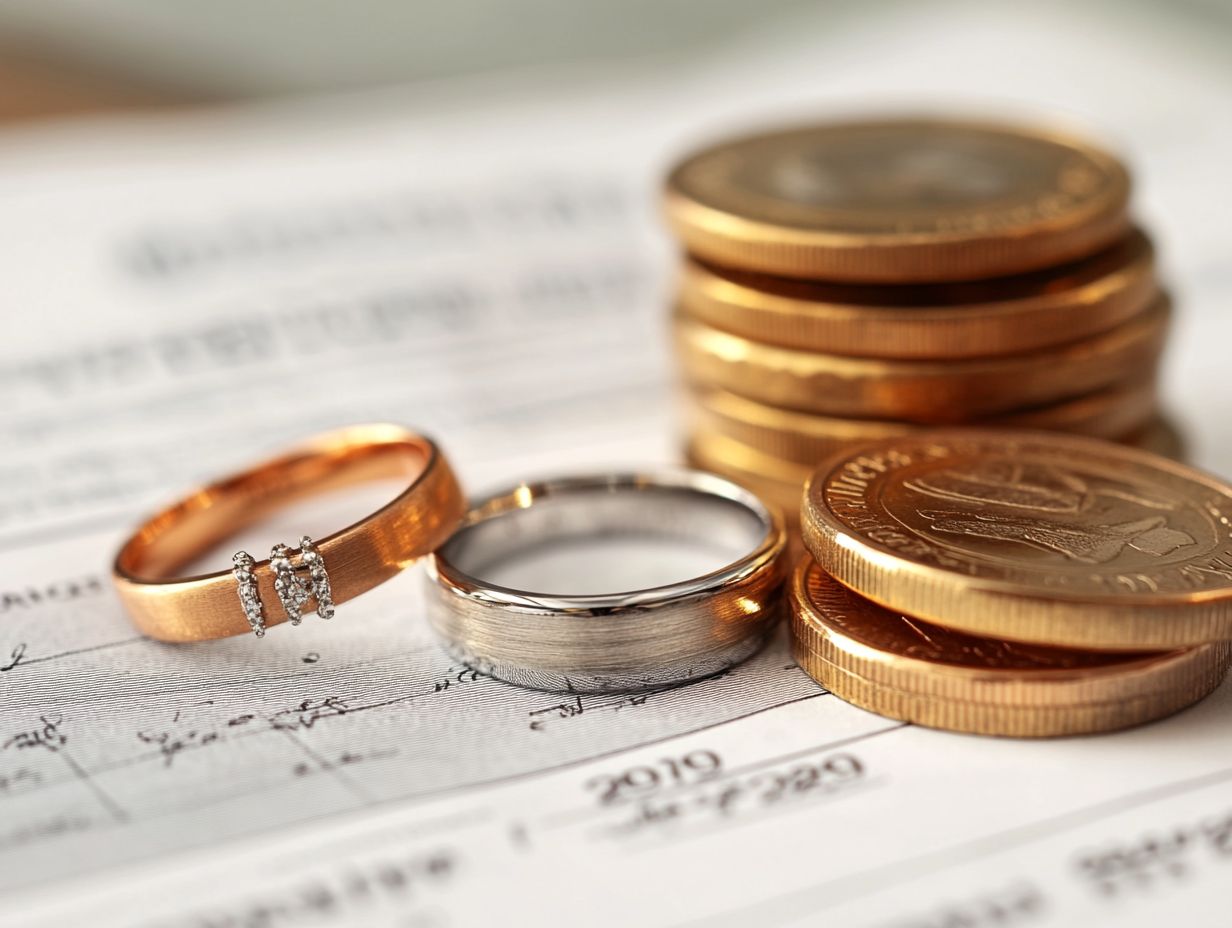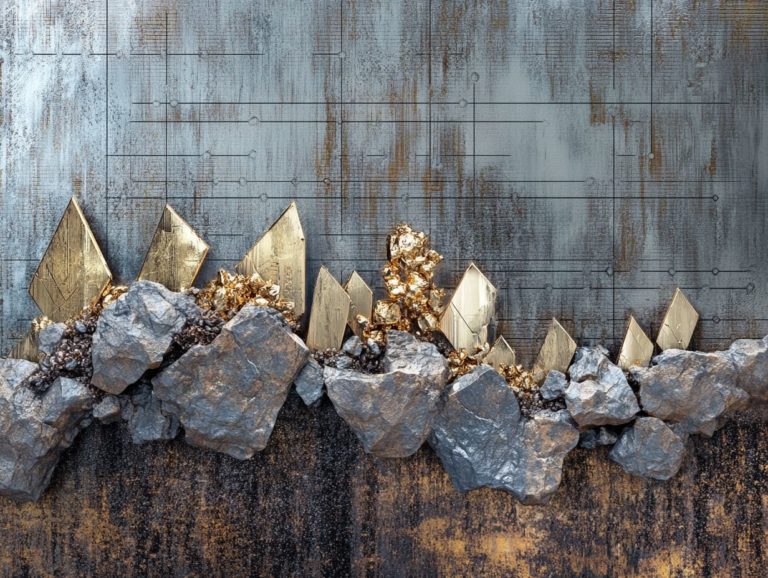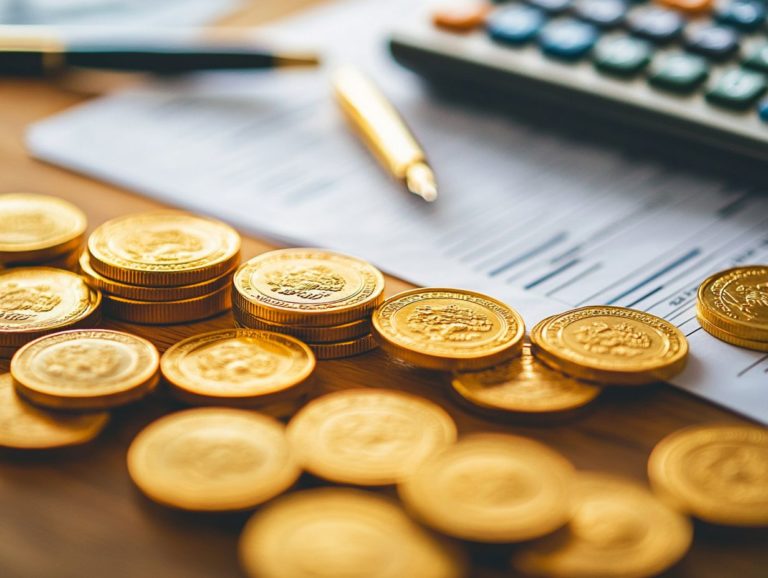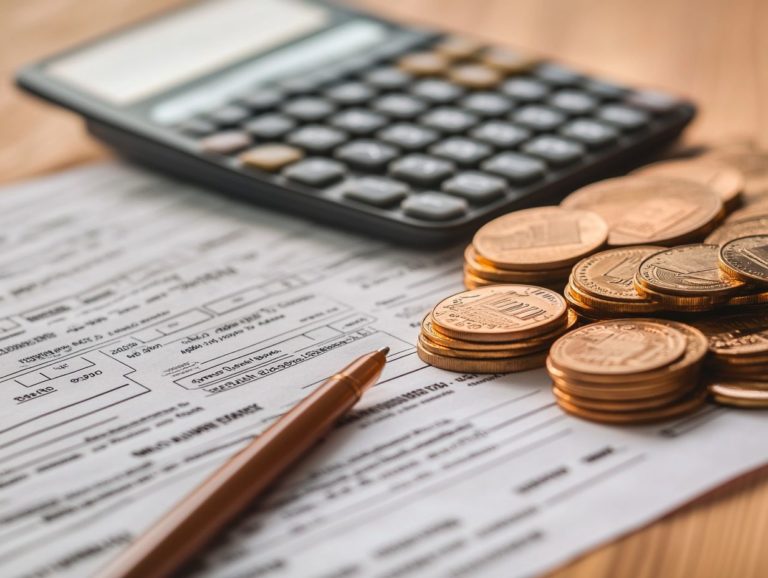Taxation of Precious Metals in Divorce Settlements
Divorce can be a complex and emotional journey. When it comes to dividing precious metals, the process becomes even more intricate.
Understanding the taxes involved, including capital gains and gift tax, is essential for making well-informed decisions. This guide will show you practical ways to divide precious metals effectively!
Whether you’re navigating legal considerations or striving for a fair compromise, this guide equips you with the knowledge necessary to approach the situation confidently. Making quick and informed decisions is crucial to protect your assets during a divorce.
Contents
- Key Takeaways:
- Tax Implications of Dividing Precious Metals
- Methods for Dividing Precious Metals in Divorce
- Valuing Precious Metals in Divorce Settlements
- Tips for Negotiating Precious Metals in Divorce
- Frequently Asked Questions
- What are precious metals in the context of divorce settlements?
- Are precious metals subject to taxation in divorce settlements?
- How is the value of precious metals determined in a divorce settlement?
- Can I transfer precious metals directly to my former spouse in a divorce settlement without incurring taxes?
- What are the tax implications if I keep the precious metals from our divorce settlement and sell them later?
- Are there any exemptions or special tax rules for precious metals in a divorce settlement?
Key Takeaways:
- Taxes on precious metals in divorce settlements may include capital gains tax and gift tax.
- Methods for dividing precious metals include direct division or offsetting with other assets.
- Valuing precious metals in divorce settlements requires consideration of factors and may involve professional appraisal.
What are Precious Metals?
Precious metals, such as gold, silver, and platinum, hold significant value due to their rarity, beauty, and investment potential.
You’ll often encounter them in various forms, from coins and jewelry to collectibles like antiques and luxury items.
When navigating divorce proceedings, understanding how these assets are classified is vital. They can greatly influence asset division and equitable distribution of marital property.
These metals aren’t just beautiful adornments; they also serve as a hedge against inflation. This makes them a staple in many investment portfolios.
People often turn to precious metals for their stability and liquidity, especially during uncertain economic times.
Their market value fluctuates based on global demand and supply dynamics.
In the context of divorce, the legal implications surrounding these assets can lead to detailed discussions. It’s essential for both parties to consider the intrinsic value of items like wedding bands or collectible coins.
These items’ worth can play a crucial role in achieving a fair settlement.
Tax Implications of Dividing Precious Metals
When you navigate the complexities of divorce, grasping the tax implications of dividing precious metals becomes crucial. The IRS imposes various taxes that can significantly impact both your financial health and the overall strategy for asset division.
These implications may encompass capital gains tax when you sell or transfer ownership of valuable assets like gold and jewelry. Understanding these nuances ensures you’re making informed decisions throughout the process.
Capital Gains Tax
Capital gains tax is a vital consideration for you when dividing precious metals in a divorce. It applies to the profits you make from selling or transferring assets like gold and collectibles.
This can lead to considerable tax liability under IRS regulations.
Understanding how this tax is calculated is essential. It hinges on the difference between the asset’s original purchase price and its current market value.
When an asset appreciates, you become liable for taxes on that gain upon selling or transferring it. For example, if you acquired gold coins valued at $5,000 and they are worth $10,000 at the time of divorce, calculate the taxable gain of $5,000.
This tax responsibility can significantly influence the financial assets each spouse receives. Often, it prompts negotiations about who will bear the tax burden.
Therefore, it’s crucial for both spouses to be aware of these financial implications to ensure a fair division.
Gift Tax
Understanding gift tax is crucial during divorce proceedings, especially when one spouse transfers ownership of valuable assets like precious metals or collectibles. The IRS has specific regulations that can significantly impact how assets are divided and your overall financial health.
This aspect is particularly important because transferring such items can unintentionally trigger tax liabilities. This can influence not just your immediate financial situation but also your long-term estate planning strategies.
For instance, if jewelry is gifted, the recipient might face a tax burden that complicates their finances after the divorce. Act now to get expert guidance on these rules. You may be able to utilize gift tax exemptions, which are ways to give gifts without incurring taxes, and structure transfers to minimize taxable events.
Prudent estate planning can ensure that both parties grasp the implications of their decisions. This can facilitate a smoother transition as they go their separate ways.
Methods for Dividing Precious Metals in Divorce
When it comes to dividing precious metals during a divorce, employing strategic methods is essential for ensuring a fair distribution of assets. This may involve negotiating property settlements or directly allocating the assets based on their assessed value and ownership documentation.
A thoughtful approach will help you navigate this process with clarity and confidence.
Direct Division
Direct division is the straightforward method of splitting precious metals, like gold or jewelry, between spouses during a divorce. This is often based on their assessed market value to ensure an equitable distribution.
This method makes the process easier and ensures both parties feel fairly treated. When appraisals are necessary, it’s vital to select a reputable professional to determine the fair market value, as this can significantly impact your financial strategy going forward.
While fairly dividing valuable items like jewelry can ease the transition, it may also stir up a whirlwind of emotions, especially if there’s sentimental value involved. Acknowledging these emotional factors is crucial, as they can profoundly influence how you and your spouse navigate your financial futures and approach asset valuation after the divorce.
Offsetting with Other Assets
Offsetting precious metals with other assets is a savvy strategy in divorce settlements. This enables one spouse to keep specific valuable items while compensating the other with cash or alternative assets, like retirement accounts or collectibles.
This approach preserves the emotional significance of certain items and aims to foster a fair financial outcome for both parties. By carefully evaluating each individual’s financial contributions and acknowledging the total value of their assets, the settlement can achieve a more equitable distribution.
Incorporating a variety of asset types in this offsetting process helps maintain balance. This ensures that neither party feels at a disadvantage. Ultimately, this thoughtful strategy promotes collaboration and mutual understanding during what can often be a challenging transitional period.
Valuing Precious Metals in Divorce Settlements
Accurate valuation of precious metals is essential in divorce settlements. It not only establishes market value but also significantly influences the equitable distribution of assets.
This makes appraisals and professional assessments vital components of your financial strategy and estate planning.
Factors to Consider
When valuing precious metals in divorce settlements, consider several factors. These include fluctuations in market value, the condition of the items, and the potential for appreciation or depreciation over time.
The economic environment is crucial. For example, global demand driven by geopolitical events or inflation can significantly sway prices.
Collectibles, in particular, often have unique traits that might lead to higher valuations than standard bullion. Vintage coins can be affected by rarity and collector interest, while gold retains its status as a staple due to its universal acceptance.
Understanding these dynamics enables you to craft a financial strategy that protects your assets and anticipates potential shifts in market conditions.
Professional Appraisal Options
In divorce settlements, obtaining a professional appraisal for precious metals is often essential. It ensures accurate valuations aligned with market standards, facilitating equitable asset distribution.
The expertise of a certified appraiser can greatly impact your case. They possess extensive knowledge about current market prices, trends, and the intrinsic values of metals like gold and silver.
Different types of appraisals—such as insurance appraisals, tax appraisals, and forensic appraisals—serve distinct purposes. Understanding these can inform your estate planning decisions and ensure fair treatment during financial negotiations.
Tips for Negotiating Precious Metals in Divorce
Navigating the division of precious metals during divorce can be a challenge. However, with effective communication and a well-defined financial strategy, you can streamline the process.
This approach simplifies negotiations and paves the way for a more equitable outcome for all involved.
Communication and Compromise
Effective communication and a willingness to compromise are essential when dividing precious metals in a divorce. These elements can radically change outcomes!
Creating a comfortable environment for sharing perspectives is crucial. Active listening allows you to understand the other person’s viewpoints, reducing the chances of misunderstandings.
Outlining each spouse’s contributions—both monetary and emotional—sets the stage for equitable solutions. Encouraging transparency about financial situations fosters compromise, leading to a clearer understanding of the assets involved.
This approach ensures decisions are rooted in mutual respect and a genuine desire for fairness.
Legal Considerations
Legal considerations play a crucial role in negotiating the division of precious metals during divorce. Consulting a divorce attorney offers valuable insights into asset division laws and the nuances of prenuptial or postnuptial agreements.
These agreements greatly influence how assets are categorized and divided, potentially keeping certain holdings safe from sharing. Understanding existing court orders helps you avoid conflicts and ensures compliance.
Having legal guidance means you’re aware of your rights and obligations, making it easier to navigate fair negotiations. This mediation process promotes clarity and protects the interests of both parties, facilitating a smoother transition.
Ultimately, this approach leads to more satisfactory outcomes for everyone involved.
Frequently Asked Questions
Have questions about the division of precious metals in divorce? Seek professional help or advice tailored to your specific situation!
What are precious metals in the context of divorce settlements?
Precious metals are rare and valuable natural elements. They include gold, silver, platinum, and palladium, and are often considered assets in divorce settlements.
Are precious metals subject to taxation in divorce settlements?
Yes, precious metals are taxable assets in divorce settlements. Both parties must report the value of any precious metals they receive.
How is the value of precious metals determined in a divorce settlement?
The value is typically determined by the current market value at the time of divorce. This may require a professional appraisal or consultation with a financial expert.
Can I transfer precious metals directly to my former spouse in a divorce settlement without incurring taxes?
No, transferring precious metals in a divorce is considered a taxable event. Both parties must report the transfer and pay taxes on the value of the metals received.
What are the tax implications if I keep the precious metals from our divorce settlement and sell them later?
If you keep the precious metals from your divorce and sell them later, you must report any gains or losses on your taxes. Understanding how this affects your finances is crucial.
Are there any exemptions or special tax rules for precious metals in a divorce settlement?
There are no specific exemptions for precious metals in divorce settlements. However, you may use the cost basis of the metals to help determine your taxes. Consult a tax professional for advice tailored to your situation.



















